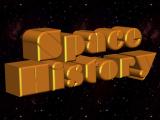If you are not already a subscriber, you are welcome to enter your email address here to sign up to receive the Space History newsletter on a daily basis. Under no circumstances will we release your legitimate email address entered here to outside persons or organizations, and it will only be used for mailing the specific information you have requested.
| Enter your email address here: |
Unsubscribe instructions are included in every newsletter issue in case you decide you no longer wish to receive it.
Note: We record the IP address from which subscriptions are entered to help prevent SPAM abuses.
Race To Space
Someone will win the prize...
... but at what cost?
Visit RaceToSpaceProject.com
to find out more!
1178
Five Canterbury monks saw what appeared to be a meteor hitting the Moon, possibly the Giordano Bruno crater being formed, but questions remain. Current oscillations of the Moon's distance, on the order of meters, may be a result of this collision.
ref: science.nasa.gov
1650
Died, Christoph Scheiner, German astronomer
ref: en.wikipedia.org
1799
Born, William Lassell, astronomer (equatorial telescope mount, discovered satellites of Saturn, Uranus and Neptune)
ref: en.wikipedia.org
1878
C. H. F. Peters discovered asteroid #188 Menippe.
1922
Died, Jacobus C. Kapteyn, Dutch astronomer (extensive studies of the Milky Way, first discoverer of evidence for galactic rotation)
Jacobus Cornelius Kapteyn, (19 January 1851 - 18 June 1922) was a Dutch astronomer, best known for his extensive studies of the Milky Way and as the first discoverer of evidence for galactic rotation.
ref: en.wikipedia.org
1937
Born, Vitali Mikhailovich Zholobov (at Zburjevka, Kherson Oblast, Ukrainian SSR), Colonel Soviet AF, Soviet engineer, cosmonaut (Soyuz 21; over 49d 6.25h in spaceflight)

Boris Volynov and Vitaly Zholobov (right) on a 1976 Soviet stamp
Source: Wikipedia
ref: www.spacefacts.de
1959
USSR launched Luna E-1A No.1 (a.k.a. E-1 No.5 or Luna 1959A) from Baikonur, an attempt to reach the Moon and impact its surface. However, the inertial system failed at T+153 seconds and the vehicle was destroyed by range safety.
ref: nssdc.gsfc.nasa.gov
1977
NASA's Space Shuttle "Enterprise" carried a crew aloft for the first time, in a captive active flight, attached to the modified Boeing 747 Shuttle Carrier Aircraft. The flight from Edwards lasted 55 minutes 46 seconds.
ref: en.wikipedia.org
1980
C. Shoemaker discovered asteroid #2891 McGetchin; and E. Bowell discovered asteroid #2569 Madeline.
1983 07:33:00 EDT (GMT -4:00:00)
NASA launched STS 7 (Challenger 2, 7th Shuttle mission) with Dr. Sally Ride aboard, the first American woman in space.

STS 7 crew, NASA artwork
Source: NASA Space Shuttle Mission Archives
The launch of STS 7 on 18 June 1983 proceeded as scheduled with no delays.
Flying on STS 7, Dr. Sally Ride became the first American woman to fly in space. The flight also represented the first use of the robotic arm remote manipulator system (RMS) to deploy and retrieve a satellite. Two communications satellites were deployed, ANIK C-2 for TELESAT Canada, and PALAPA-B1 for Indonesia, both attached to Payload Assist Module-D (PAM-D) motors. Seven Get Away Special (GAS) canisters in the cargo bay held a variety of experiments including ones studying effects of space on the social behavior of an ant colony in zero gravity. Ten experiments mounted on the Shuttle Pallet Satellite (SPAS-01) performed research in forming metal alloys in microgravity and the use of a remote sensing scanner. The orbiter's small control rockets fired while SPAS-01 was held by the remote manipulator system to test movement on the extended arm. Experiments to investigate space sickness were carried out. The other payloads on the flight were: Office of Space and Terrestrial Applications-2 (OSTA-2); Continuous Flow Electrophoresis System (CFES); Monodisperse Latex Reactor (MLR); and one Shuttle Student Involvement Program (SSIP) experiment.
STS 7 ended on 24 June 1983 when Challenger landed on revolution 98 on Runway 15, Edwards Air Force Base, California. Rollout distance: 10,450 feet. Rollout time: 75 seconds. Launch weight: 249,178 pounds. Mission duration: six days, two hours, 23 minutes, 59 seconds. Orbit altitude: 160-170 nautical miles. Orbit inclination: 28.5 degrees. Miles traveled: 2.5 million. The planned landing at Kennedy Space Center was scrubbed due to poor weather conditions, and the mission was extended two revolutions to facilitate the landing at Edwards. The orbiter was returned to KSC on 29 June 1983.
The flight crew for STS 7 was: Robert L. Crippen, Commander; Frederick H. Hauck, Pilot; John M. Fabian, Mission Specialist; Dr. Sally K. Ride, Mission Specialist, the first American woman in space; Norman E. Thagard, Mission Specialist.
ref: www.nasa.gov
1984
Perth Observatory discovered asteroid #3541.
1989
Comet Churyunov-Gerasimenko, which became the target of the ESA's Rosetta mission, passed through perihelion.
ref: sci.esa.int
1999 01:49:00 GMT
The Astra 1H was launched from Baikonur on a Proton booster, and positioned in geosynchronous orbit at 19 deg E in 1999.
ref: nssdc.gsfc.nasa.gov
We are going to run out of oil!
Visit SpacePowerNow.org
to help fix the problem.
SpacePowerNow.org - For Human Survival
This newsletter and its contents are Copyright © 2006-2025 by The L5 Development Group. All rights reserved. - Publication, in part or in whole, requires previous written permission. - Academic or personal-use citations must refer to http://L5Development.com as their source. Thank you for your cooperation.
Space History Department
Resources
The L5 Development Group Home Page
The L5 Development Group Keyword Access System
Space History for June 18 /
Webmaster /
Script last modified August 23, 2018 @ 6:05 am
Copyright © 2006-2025 by The L5 Development Group. All rights reserved.
Hosted by FKEinternet



